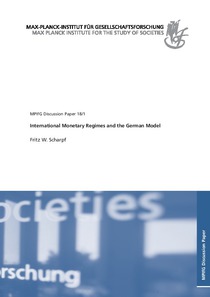International monetary regimes and the German model

Max-Planck-Institut für Gesellschaftsforschung, Köln
MPIfG - Köln
2018
81 p.
EMU ; German model ; economic model ; structural change
Discussion Paper
18/1
EMU and International monetary system
English
Bibliogr.
"The end of the Bretton Woods regime and the fall of the Iron Curtain deepened the export orientation of the German model of the economy. Only after entry into the Monetary Union, however, did rising exports turn into a persistent export–import gap that became a problem for other eurozone economies. This Discussion Paper shows why the present asymmetric euro regime will not be able to enforce their structural transformation on the German model. Neither will German governments be able to respond to demands that would bring the performance of the German economy closer to eurozone averages. Instead, it is more likely that present initiatives for financial and fiscal risk sharing will transform the Monetary Union into a transfer union. "
Digital
The ETUI is co-funded by the European Union. Views and opinions expressed are however those of the author(s) only and do not necessarily reflect those of the European Union or the ETUI.